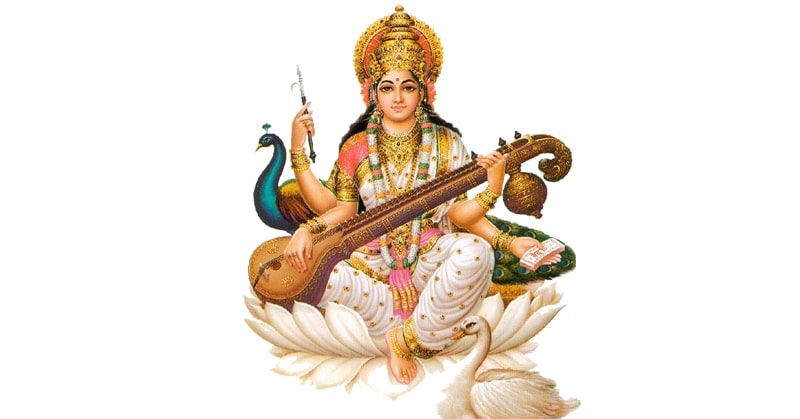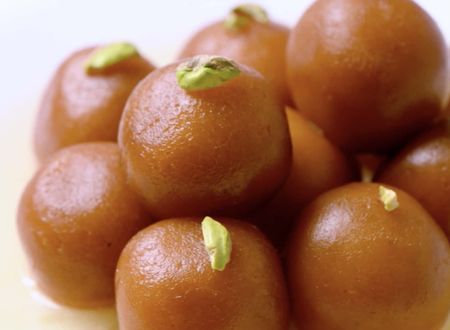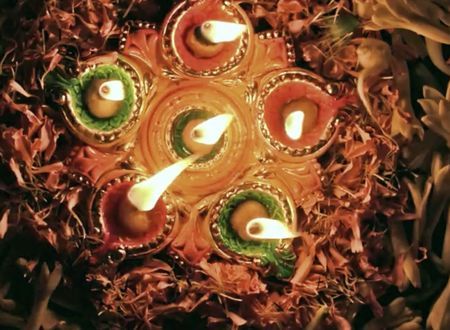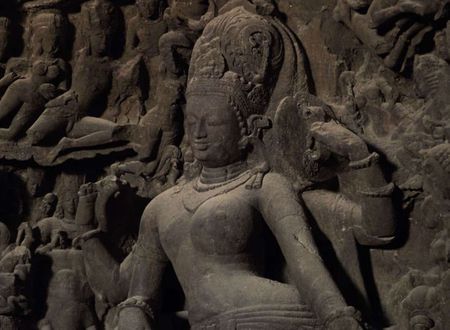Sanatana Dharma visualizes the Divine Goddess in three different aspects: Goddess Saraswati, Goddess Durga, and Goddess Laxmi. This is not to say that they are three different realities. The Divine has been declared unanimously as one by Vedas. However, one perceives the same reality in three different aspects.
In this post, I wish to write a few words of glory on the aspect of the Divine Goddess as Mahasarawati. The intent here is not to comprehend the reality as to how can, a mere mortal can even dare to comprehend the Absolute. Treat the below post as a humble attempt of a child trying to reach her mother by contemplating her. I invoke my great master, our beloved Swamiji so that he guides me to write a few words of glory for Divine mother. If the post is able to fill you with some devotion and helps you connect with maa, consider that as a grace of Swamiji, any mistakes or errors belong to me.
Goddess Saraswati:
The word” Saraswati” comes from two words “saras” and “vati”. Saras means “stream or flow” and wati means “one who possesses”. The one who possesses the flow, the flow or stream of consciousness is MahaSaraswati. It is impossible to define Maa or even contemplate her glory, yet she comes to us and we can connect with her if we learn to connect with the stream of our consciousness.
The question is how to connect with the one with flowing movement. Sages gave us this great secret in the form of weapons Mahasarawati holds in her hands. The four weapons she holds are Rosary, Books, Veena, and a water pot.
Deity: Mahasaraswati
Manifested Reality: Flowing movement of consciousness reflected as intuition, wisdom, inspiration, and revelation. If you will pause for a moment and observe, all these four aspects always come in a flow. It appears as if they do not belong to you, rather you just came in contact with some flowing stream and grasp something out of the vast river of consciousness.
Methods to connect:
Rosary: The first method shared by sages is hidden in the first weapon maa holds as Rosary. Rosary represents the tapas and is the symbolic representation of the path of meditation. One can connect with the Divine Goddess Saraswati by the means of meditation. A seeker who walks the path of meditation will surely meet Maa in the form of intuition.She will bloom in the heart of such a sadhak in her full glory as intuitive and mystical powers. This is also known as the path of dhyana yoga in the Srimad Bhagavad Gita, one of the sacred texts of Sanatana Dharma.
Books: The second method shared by sages is hidden in the second weapon maa holds as Books. Books represent the power of words and the contemplation of those words and are the symbolic representation of the path of knowledge or discrimination. A seeker who walks the path of Knowledge will surely meet Maa in the form of wisdom. Instead of just having theoretical knowledge, the one who approaches books as a way to connect with the divine stream of consciousness will be blessed by the Divine in the form of wisdom to apply the knowledge in the world. This is also known as the path of Jnana yoga in the Srimad Bhagavad Gita.
Veena: The third method shared by sages is hidden in the third instrument Maa holds as Veena. Veena represents the power of sound as a means to connect with the Divine Goddess. One may choose to connect with the divinity within in the form of music. A seeker who walks the path of music to connect with the Divine will surely meet Maa in the form of inspiration and creativity. Creativity blooms in the heart of such a seeker and he sings, writes, creates, and invents. She is the power of all the works in the universe.This is also known as the path of Bhakti yoga in the Srimad Bhagavad Gita, one of the sacred texts of Sanatana Dharma.
Veena is such an inseparable part of Maa Saraswati that one can not visualize a picture of Maa without Veena. This also emphasizes the efficacy of this method, which can be a support to both the path of meditation and the path of knowledge.
Japa is a form of intense meditation that takes the support of Veena, as you chant the mantra, subtle music or rhythm accompanies the mantra that helps you in an act of concentration.
In the same way, the Path of knowledge is based on three pillars: Sravana, Manana, and Nididhyasana. Sravana relates to the listening pat that uses sounds as an aid, manana is the actual contemplation part representing knowledge, and Nididhyasana relates to the meditation part of the same knowledge. If we care to see these paths closely, we would find they are not altogether different and are interrelated and interdependent.
Water Pot: The third method shared by sages is hidden in the fourth weapon Maa holds as a water pot. The water element is synonymous with the process of purification in the Vedic world. This stands for the power of purification of self as means to connect with the Divine Goddess. A seeker who sincerely walks the path of Self-Purification will surely meet Maa in the form of revelation. This is also known as the path of Karma Yoga in the Srimad Bhagavad Gita, one of the sacred texts of Sanatana Dharma.
What will she reveal? She will reveal herself to this seeker who walks the path of purity and truth.
Let’s meditate on her Divine form and four aspects. Let’s connect with Maa using either of the methods or all of them. May Maa reach each of her children(including Maa) in her full and pristine glory.
🌼🌼🌼Aum Devi Mahasarasvatayai Namah🌼🌼🌼
🌼🌼🌼All Glories to Swamiji alone🌼🌼🌼









Comments & Discussion
30 COMMENTS
Please login to read members' comments and participate in the discussion.